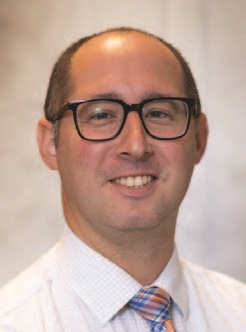“The entire team, from the nurses to the housekeeping team, made me feel like I was in my home away from home.”

When Julia Rodriguez De Los Santos gave birth to her third child, Jayden in February 2024 at Clara Maass Medical Center, an RWJBarnabas Health hospital, he was immediately diagnosed with bladder exstrophy.
This rare condition occurs when a baby’s bladder and lower abdominal wall don’t close properly during fetal development. Jayden’s pubic bones were separated, and his bladder remained open outside of his abdomen. Because the bladder and urethra were not formed completely, his bladder couldn’t hold urine.

The primary treatment option for bladder exstrophy is surgical reconstruction. Because Jayden’s bladder resembled a flat plate instead of a rounded balloon, it would need to be reformed to hold urine. Additionally, his malformed urethra and penis would need to be closed. He was transferred to the neonatal intensive care unit (NICU) at the Children’s Hospital of New Jersey at Newark Beth Israel Medical Center, part of the Children’s Health Network at RWJBarnabas Health.
After thoroughly examining Jayden, pediatric urologist Charles Concodora, MD, a member of the Children’s Health Network and RWJBarnabas Health Medical Group, found that Jayden’s bladder was quite small and contained several benign polyps. He explained Jayden’s condition to his mother and tried to allay her fears by explaining that because Jayden was still able to eat and his other organs were unaffected, there was a very high likelihood that reconstructive surgery would be successful.
A First of Sorts

While the children’s hospital ranks among the nation’s Best Children’s Hospitals for 2024 – 2025 by U.S. News & World Report for Urology, bladder exstrophy reconstruction surgery is rarely performed. Luckily, pediatric urologist Wayland Wu, MD, a member of the Children’s Health Network and RWJBarnabas Health Medical Group and assistant professor of Pediatric Urology at Rutgers Robert Wood Johnson Medical School, has expertise in the procedure. Without this expertise, Jayden and his family likely would have needed to travel to a hospital in Philadelphia, Baltimore, or Boston for care.
“The challenge is finding a surgeon who is experienced and comfortable performing it and a hospital that can handle the level of post-operative care this procedure requires,” Dr. Wu explained. “I was very comfortable offering this treatment option to Jayden’s family given my surgical training.”
A Staged Approach to Returning Bladder Function
There are two ways of performing the surgery: as one complex, intensive surgery, called a complete primary repair, or a step-wise approach called a modern stage repair. Dr. Wu prefers the more conservative staged option, which repairs the defect via three surgeries. This approach, which has a 90 percent success rate, gives the child time to heal and grow stronger after each surgery.
The first step was to surgically remove the polyps from Jayden’s bladder and assess the quality of the bladder, which was performed when he was seven days old. Delayed closure was preferred because of the overall quality of the bladder.
“Imagine that you have a paper plate with many rocks on it. It’s difficult to fold the plate into a ball because the rocks are in the way,” Dr. Wu explained. “Jayden’s bladder formed as a flat plate instead of a ball, so we had to remove the polyps to allow us to reshape it.”
Jayden spent nine days in the NICU after surgery before being discharged home.
Teamwork and Collaboration Ensure Success

Before the main reconstructive surgery, Dr. Wu met with the perioperative team at the medical center to discuss the case and ensure all the necessary equipment and protocols were in place. Reforming the bladder and correcting the position of the pelvic bones would require a multidisciplinary team of surgical specialists. In addition to Dr. Concodora and Dr. Wu, the team also included pediatric orthopedic surgeons O. Folorunsho Edobor-Osula, MD, and Thomas McPartland, MD, pediatric critical care specialist Derrick A. McQueen, MD, pediatric anesthesiologist Mark A. Hausdorff, MD, and the pediatric hospitalist team led by Jayshree N. Kumta, MD.
“Everyone was on board with the surgery and knew their roles well,” Dr. Wu explained. “We communicated often and discussed each phase of the surgery, the immediate post-op period in the Pediatric ICU and the goals upon transferring him to a general surgical unit.”
In September 2024, the six-month-old had bladder reconstruction surgery and tubes were inserted to drain his kidneys and bladder to divert urine out of his body. Jayden spent five weeks in the hospital, including three weeks in the Pediatric ICU at the Children’s Hospital of New Jersey, before the pins used to keep Jayden’s pelvic bones in place and the tubes redirecting urine were removed. Before removal, Dr. Wu confirmed that Jayden’s bladder held urine and that urine exited the body properly through the reconstructed urethra.
“It was a difficult time for me,” Rodriguez De Los Santos recalled. “I was afraid my baby was going to die, but I relied on my faith to get through it.”
She became more active in her church after Jayden’s birth. She thanks God and the doctors, nurses, and the rest of Jayden’s care team for the positive outcome. She especially thanks Dr. Wu for visiting her son daily while he was in the hospital.
“The entire team, from the nurses to the housekeeping team, made me feel like I was in my home away from home,” she explained.
View more information about children’s health or find a pediatric specialist.